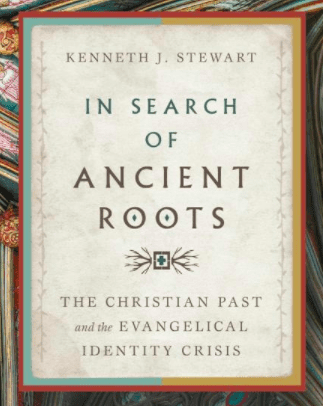The numbers are imbalanced: far more are leaving Catholicism or Orthodoxy for evangelicalism (in a broad sense, including Pentecostalism) than leaving evangelicalism for Catholicism or Orthodoxy. If Catholic leaders are concerned about the exodus of Catholics for evangelicalism, some evangelical leaders are concerned with evangelicals crossing the Tiber.
 One who is is Ken Stewart, and in the last chapter of his book In Search of Ancient Roots he describes what appear to me to be his impressions and conclusions of why evangelicals turn toward Catholicism and in some cases Orthodoxy. Here are his six conclusions:
One who is is Ken Stewart, and in the last chapter of his book In Search of Ancient Roots he describes what appear to me to be his impressions and conclusions of why evangelicals turn toward Catholicism and in some cases Orthodoxy. Here are his six conclusions:
For some, a return to the church of one’s upbringing.
The search for the “historic church” as a haven from sectarianism.
The desire for liturgical and doctrinal stability.
Attraction to a style of worship that is “objective.”
An admiration for the Catholic intellectual and theological tradition.
A strong tendency, long present in American evangelicalism, to aim at recovering the “primitive” yet in eclectic fashion.
In the book Hauna Ondrey and I wrote called Finding Faith, Losing Faith, I outlined the following reasons why evangelicals on the basis of the reasons converts give. These reasons emerge from my study of the “crisis” phase of religious conversion, and I call this “Leaving Wheaton, Finding Rome”:
A desire for transcendence is a crisis about the limitations of the human condition and a desire to go beyond the ordinary human experience. This occurs, for the ERC [evangelical conversion to Roman Catholicism], in four manifestations. First, the ERC wants to transcend the human limits of knowledge to find certainty; second, the ERC wants to transcend the human limits of temporality to find connection to the entire history of the church; third, the ERC wants to transcend the human limits of division among churches to find unity and universality in the faith and church; and fourth, the ERC wants to transcend the human limits of interpretive diversity to find an interpretive authority. These four desires— certainty, history, unity, and authority—are the four manifestations of the ERC’s crisis of transcendence.
Stewart’s analysis then, so it seems to me, is too theological and does not take into sufficient consideration the reasons converts actually give. He’s right with each one but, to sound a bit like Flannery, “he ain’t right enough.”
I would add to what Stewart says and what is in my own study this: the politicization of the evangelical movement has driven many out of evangelicalism and some of them have found their way into Catholicism, Orthodoxy and other denominations (including Anglicanism).
The Political Turn of Evangelicalism is toxic to the soul of evangelicalism. I jump from this onto another, but parallel, discussion. In his new book, Contours of the Kuyperian Tradition, Craig Bartholomew, a South African, says “Reformed Christianity,” whose representatives helped create apartheid, “lacks credibility in South Africa.” Evangelicalism, not in the same way and only perhaps not with the same devastating impact, lacks credibility and its incredibility is growing every day. The apartheid of social capital in our culture must be resisted by the prophetic voice of Jesus embodied in the church, and evangelicalism needs to stand up to be counted in that embodiment.
Having said that our reasons for leaving are not the same, our agreement extends to the basic solution: teaching evangelicals about the breadth and history of the church and its deep theology. Had evangelicalism of the 20th Century, and at least the second half, spent more of its energy teaching — catechizing — converts into the deep history of the church and its creeds some of these conversions would not have occurred.
Put differently, it was the absence of the catechizing converts into the deep traditions of the church that permitted the superficiality of so much of modern non-denominational evangelicalism’s grasp of theology that created a vacuum that leads both to the resurgence of Calvinism (seen as a deep tradition) and the turn toward the liturgical and historic traditions of the church.
It will take more than a generation of serious education — in seminaries, in Christian colleges, and in local churches — to remedy this disordered understanding of the church, its theology, and its history. In a day when many — far too many — clamor for relevance and the newest thing in leadership and any number of idolatries substituting for the gospel, it is even harder to advocate for a course or two in the patristics and in the creeds and in the Reformation. There are signs of many evangelicals wanting to study the patristics. In a search I was involved in at North Park we had a hundred or so candidates in church history and theology, and we had not one who majored in the Reformation. They were either in patristics or in modern theology or church history.
Will this interest work its way into seminaries, colleges and churches?















